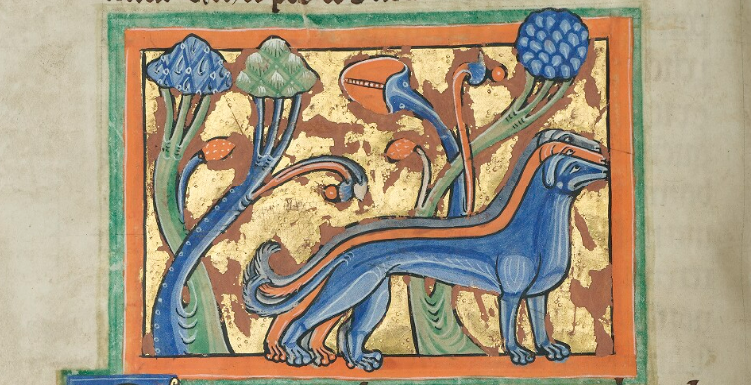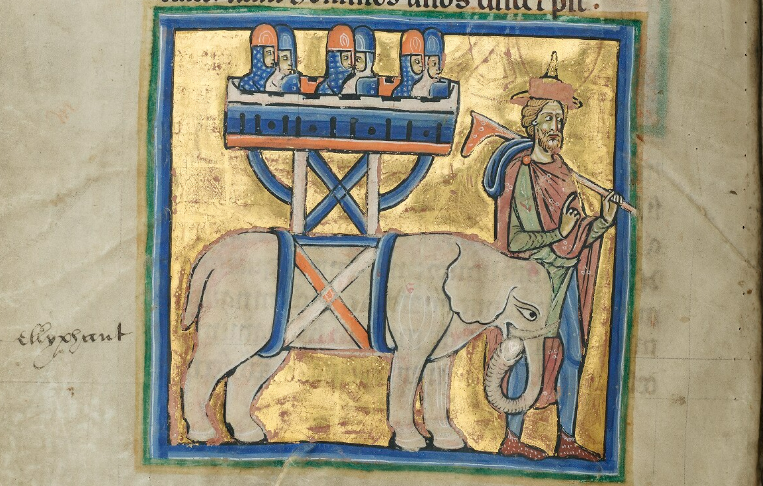Week 3 has arrived, and the term (and year) seem to be rushing by. Today is, of course, a bank holiday, but OMS is still here to bring you all of the latest Medieval News. I hope that you are all managing to get some rest as well as some work done. For those of you who (like me) feel that term is flying by, here is a reminder to slow down and enjoy our work, from the Epistolae project
ANNOUNCEMENTS:
- Workshop: Binding the world, withholding life: Poetry Books in the Medieval Mediterranean (31st May, Exeter College, FitzHugh Auditorium, Walton St, Oxford OX1 2HG and online.). This workshop focuses on the circulation of poems in the medieval Mediterranean, which is used as a case study to explore medieval literature. The event is part of the activities of the TORCH Network Poetry in the Medieval World. Registration is required for online participation.
- Report on the ongoing Old Norse-Iceland exhibition which is on at the Taylorian by Katarzyna Kapitran
EVENTS THIS WEEK:
Monday 6th May:
- The Medieval Latin Manuscript Reading Group meets at 1-2pm on Teams. A friendly venue to practice your Latin and palaeography on a range of texts and scripts. We will read a very entertaining account of the legendary foundation of Cambridge University by the Carmelite friar Nicholas Cantlow. Sign up to the mailing list to receive weekly updates and Teams invites. https://web.maillist.ox.ac.uk/ox/info/medieval-latin-ms-reading
- The Tolkien 50th Anniversary Seminar Series meets at 5pm in the Summer Common Room, Magdalen College. This week’s speaker will be Edmund Weiner (Oxford English Dictionary), ‘I always felt that something ought to be done about the word…’: Tolkien’s latchwords. For more information, please see https://tolkien50.web.ox.ac.uk/.
- The Medieval History Seminar meets at 5pm in the Wharton Room, All Souls College and on Teams. The Teams session can be accessed by logging in to Teams with your .ox.ac.uk account and joining the group “Medieval History Research Seminar” (team code rmppucs). Alternatively, you can use this link. If you have any difficulties please email: medhistsem@history.ox.ac.uk. This week’s speaker will be Helen Flatley (Somerville, Oxford): ‘Reading the Arabic Documents of Medieval Toledo: Local Practice and Community Formation on the Iberian Frontier’.
Tuesday 7th May:
- The Medieval English Research Seminar meets at 12.15pm in Lecture Room 2, English Faculty. This week’s speakers will be Audrey Southgate (Lincoln College, Oxford), ‘Playing the Ten-Stringed Lyre’: Psalter and Decalogue in the English Primers and Hannah Schühle-Lewis (University of Kent) ‘All suche clytter clatter’?: Medieval devotional compilations after the Reformation’. Seminars followed by a sandwich lunch. All welcome!
- The Medieval French Seminar meets at 5pm at the Maison Francaise. Drinks will be served from 5pm; the presentations will start at 5:15pm. All are welcome! This week’s speaker will be Richard Trachsler (Zurich University), ‘God’s Tennisman: the Jeu de Paume allégorisé and the Difficulty of Playing Ball in the Late Middle Ages‘.
- The Medieval Church and Culture Seminar meets at 5.15pm in the Wellbeloved Room, Harris Manchester College. This week’s speakers will be James Buchanan (Kellogg) English Saints and the Normans: tracing community and identity in the post conquest hagiography of St Dunstan and Cory Nguen (Univ.), Constructing Identity in 14thc Norman Ireland: law, lyric, language. Everyone is welcome at this informal and friendly graduate seminar.
- Fourth Lyell Lecture: What happens when incunables replace manuscripts? at 5.15 at the Weston Library lecture theatre by Stephen Oakley (Cambridge): Copying the Classics (and Fathers): explorations in the transmission of Latin text. Book her for in-person attendance or live-stream.
- Yossef Rapoport from Queen Mary’s will give a special presentation on “Livestock and Pastoralism in late-medieval Fayyum” at 5pm in the Fletcher Room, Trinity College. This talk is affiliated with the Oxford Collective for Nomadic and Pastoralist Peoples.
Wednesday 8th May:
- The Medieval German Graduate Seminar meets at 11.15am in Oriel College King Edward Street 7(Annette Volfing’s office; press the intercom buzzer to be let in). It will be a shortish planning meeting. The topic for this term is Konrad von Würzburg: ‘Der Schwanritter’. Open access edition here. If you are interested to be added to the teams group for updates, please contact Henrike Lähnemann.
- The Medieval Latin Document Reading Group meets at 4-5pm on Teams. A document is sent out in advance but homework is not expected. Please contact Michael Stansfield for further details and the Teams link.
- At 5pm in the Oxford Martin School, Prof Nicola Di Cosmo (Institute for Advanced Study, Princeton) will give an Environmental History Talk sponsored jointly by the Oxford Centre for European History and the Centre for Global History and the Oxford Martin School: Historical research in the time of the Anthropocene: can climate data help us read the past (and, if so, how)?.
- The Late Antique and Byzantine Seminar meets at 5pm at Ioannou Centre for Classical and Byzantine Studies, 66 St. Giles, Oxford, and online via Teams. Teams link: https://msteams.link/FW0C. This week’s speaker will be Natalija Ristovska (University of Oxford) –‘The Byzantine Craft of Enamelling and its Links with Islamic Metalwork, ca. 800-1204’.
Thursday 9th May:
- The Environmental History Working Group meets at 12.30-2pm in the Ashmolean Museum for a tour. For updates on meeting details, refer to the EHWG tab on the Environmental History website. For further information or to join the EHWG mailing list, please email environmentalhistoryworkinggroup-owner@maillist.ox.ac.uk
- The All Souls Seminar in Medieval and Early Modern Science meets at 2-3.30pm in the Hovenden Room, All Souls College. This week’s speaker will be Henrique Leitão (University of Lisbon), Global Lines and Nautical Cartography in the Iberian Oceanic Expansion.
- Fifth Lyell Lecture: Some generalizations about the shape and geographical spread of Latin textual traditions at 5.15 at the Weston Library lecture theatre by Stephen Oakley (Cambridge): Copying the Classics (and Fathers): explorations in the transmission of Latin text. Book her for in-person attendance or live-stream.
Friday 10th May:
- The Medieval Coffee Morning meets as usual 10:30am in the Visiting Scholars Centre of the Weston Library (instructions how to find it) with presentation of items from the special collections, coffee and the chance to see the view from the 5th floor terrace.
- The Oxford Medieval Manuscripts Group (OMMG) meets at 5pm in the Hawkins Room, Merton College. Sara Charles, School of Advanced Study, University of London will speak on Pigments and Illumination in the Middle Ages (practice-based). All materials are provided. £5 fee (the price is subsidised by the OMS grant). Places are limited: please write to elena.lichmanova@merton.ox.ac.uk by 01/05/2024.
- The Anglo-Norman Reading Group will meets at 5-6.30pm at the Julia Mann Room in St Hilda’s College, with the option to join remotely online. Those attending in person please be at the Lodge BY 5.00, where we will meet you and take you to the room in South Building. The texts, together with supplementary material, can be found on TT Padlet Please ensure you print the text (or bring it electronically), as we do not provide paper copies. Wine and soft drinks are available as usual!
OPPORTUNITIES:
- Stipendiary Lectureship in Old and Middle English: Exeter College are recruiting a fixed-term, part-time Stipendiary Lecturer post in Old Englis/Middle English. Please see the website for more details: https://www.exeter.ox.ac.uk/vacancies/sl-english/









